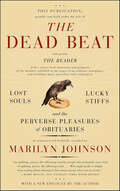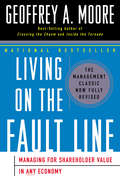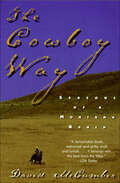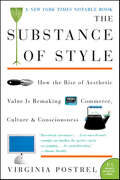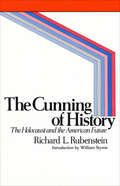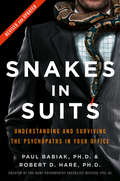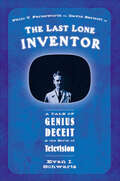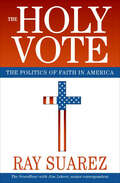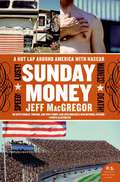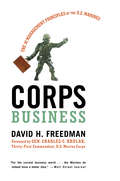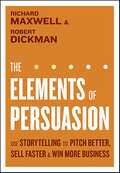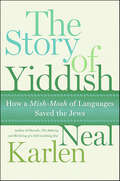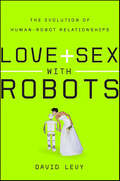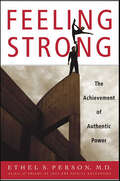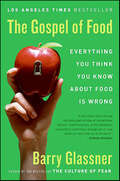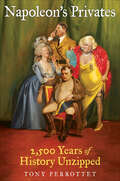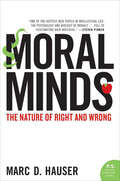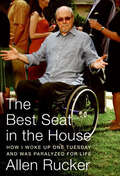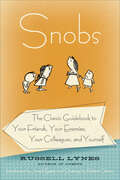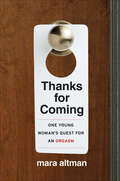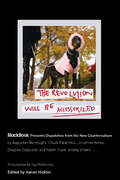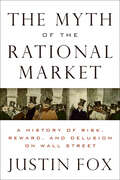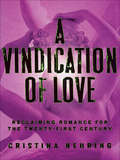- Table View
- List View
The Dead Beat: Lost Souls, Lucky Stiffs, and the Perverse Pleasures of Obituaries
by Marilyn JohnsonA light-hearted look at the history and practice of “the ultimate human-interest story,” the obituary.“What a wonderful surprise—a charming, lyrical book about the men and women who write obituaries. The Dead Beat is sly, droll, and completely winning.”— David HalberstamWhere can readers celebrate the life of the pharmacist who moonlighted as a spy, the genius behind Sea Monkeys, the school lunch lady who spent her evenings as a ballroom hostess? The obituary page, of course. Enthralled by these fascinating former lives, Marilyn Johnson tumbled into the little known world of the obituary page to find out what made it so compelling. She sought out the best obits in the English language, and chased the people who spent their lives writing about the dead. Surveying Internet chat rooms, surviving a mass gathering of obituarists, and making the pilgrimage to London to savor the most caustic and literate obits of all, she leads us into the cult and culture behind this fascinating segment of our daily news.
Living on the Fault Line,ition
by Geoffrey A. MooreThe fault line -- that dangerous, unstable seam in the economy where powerful innovations and savage competition meet and create market-shattering tremors. Every company lives on it; no manager can control it. In the original edition of Living on the Fault Line, Geoffrey Moore presented a compelling argument for using shareholder value (or share price) as the key driver in management decisions. Moore now revisits his argument in the post-Internet bubble world, proving that the methods he espouses are more germane than ever and showing companies how to use them to survive and thrive in today's demanding economy. Extending the themes of Crossing the Chasm and Inside the Tornado, his first two books on the dynamics of the high-tech markets, Moore shows why sensitivity to stock price is the single most important lever for managing in the future, both as a leading indicator of shifts in competitive advantage and as an employee motivator for making necessary changes in organizations heretofore impervious to change. This revised and updated edition includes: A deeper emphasis on core versus context, which has emerged as the key distinction in allocating resources to improve shareholder value A new Competitive Advantage Grid that will aid managers in achieving and sustaining competitive advantage, the most important component in managing for shareholder value An expanded Value Discipline Model as it relates to the Competitive Advantage Grid Analysis of the powerful new trend toward core/context analysis and outsourcing production duties Updated models of organizational change for each stage of market developmentAs disruptive forces continue to buffet the marketplace and rattle the staid practices of the past, Moore offers a brilliant set of navigational tools to help meet today's most compelling management challenges.
Living on the Fault Line
by Geoffrey A. MooreThe fault line -- that dangerous, unstable seam in the economy where powerful innovations and savage competition meet and create market-shattering tremors. Every company lives on it; no manager can control it. In the original edition of Living on the Fault Line, Geoffrey Moore presented a compelling argument for using shareholder value (or share price) as the key driver in management decisions. Moore now revisits his argument in the post-Internet bubble world, proving that the methods he espouses are more germane than ever and showing companies how to use them to survive and thrive in today's demanding economy. Extending the themes of Crossing the Chasm and Inside the Tornado, his first two books on the dynamics of the high-tech markets, Moore shows why sensitivity to stock price is the single most important lever for managing in the future, both as a leading indicator of shifts in competitive advantage and as an employee motivator for making necessary changes in organizations heretofore impervious to change. This revised and updated edition includes: A deeper emphasis on core versus context, which has emerged as the key distinction in allocating resources to improve shareholder value A new Competitive Advantage Grid that will aid managers in achieving and sustaining competitive advantage, the most important component in managing for shareholder value An expanded Value Discipline Model as it relates to the Competitive Advantage Grid Analysis of the powerful new trend toward core/context analysis and outsourcing production duties Updated models of organizational change for each stage of market developmentAs disruptive forces continue to buffet the marketplace and rattle the staid practices of the past, Moore offers a brilliant set of navigational tools to help meet today's most compelling management challenges.
The Cowboy Way: Seasons of a Montana Ranch
by David McCumberIn February of his forty-fourth year, journalist David McCumber signed on as a hand on rancher Bill Galt's expansive Birch Creek spread in Montana. The Cowboy Way is an enthralling and intensely personal account of his year spent in open country—a book that expertly weaves together past and present into a vibrant and colorful tapestry of a vanishing way of life. At once a celebration of a breathtaking land both dangerous and nourishing, and a clear-eyed appreciation of the men—and women—who work it, David McCumber's remarkable story forever alters our long-held perceptions of the "Roy Rogers" cowboy with real-life experiences and hard economic truths.In February of his forty-fourth year, journalist David McCumber signed on as a hand on rancher Bill Galt's expansive Birch Creek spread in Montana. The Cowboy Way is an enthralling and intensely personal account of his year spent in open country—a book that expertly weaves together past and present into a vibrant and colorful tapestry of a vanishing way of life. At once a celebration of a breathtaking land both dangerous and nourishing, and a clear-eyed appreciation of the men—and women—who work it, David McCumber's remarkable story forever alters our long-held perceptions of the "Roy Rogers" cowboy with real-life experiences and hard economic truths.
The Substance of Style: How the Rise of Aesthetic Value Is Remaking Commerce, Culture, and Consciousness
by Virginia PostrelWhether it's sleek leather pants, a shiny new Apple computer, or a designer toaster, we make important decisions as consumers every day based on our sensory experience. Sensory appeals are everywhere, and they are intensifying, radically changing how Americans live and work. The twenty-first century has become the age of aesthetics, and whether we realize it or not, this influence has taken over the marketplace, and much more.In this penetrating, keenly observed book, Virginia Postrel makes the argument that appearance counts, that aesthetic value is real. Drawing from fields as diverse as fashion, real estate, politics, design, and economics, Postrel deftly chronicles our culture's aesthetic imperative and argues persuasively that it is a vital component of a healthy, forward-looking society.Intelligent, incisive, and thought-provoking, The Substance of Style is a groundbreaking portrait of the democratization of taste and a brilliant examination of the way we live now.
The Cunning of History: The Holocaust and the American Future
by Richard L. RubensteinTheologian Richard L. Rubenstein writes of the Holocaust, why it happened, why it happened when it did, and why it may happen again and again."Few books possess the power to leave the reader with the feeling of awareness that we call a sense of revelation. The Cunning of History seems to me to be one of these . . . Rubenstein is forcing us to reinterpret the meaning of Auschwitz—especially, though not exclusively, from the standpoint of its existence as part of a continuum of slavery that has been engrafted for centuries onto the very body of Western civilization. Therefore, in the process of destroying the myth and the preconception, he is making us see that that encampment of death and suffering may have been more horrible than we had ever imagined. It was slavery in its ultimate embodiment. He is making us understand that the etiology of Auschwitz—to some, a diabolical, perhaps freakish excrescence, which vanished from the face of the earth with the destruction of the crematoria in 1945—is actually embedded deeply in a cultural tradition that stretches back to the Middle Passage from the coast of Africa, and beyond, to the enforced servitude in ancient Greece and Rome. Rubenstein is saying that we ignore this linkage, and the existence of the sleeping virus in the bloodstream of civilization, at risk of our future." — William Styron, from the Introduction.
Snakes in Suits
by Robert D. Hare Paul BabiakLet's say you're about to hire somebody for a position in your company. Your corporation wants someone who's fearless, charismatic, and full of new ideas. Candidate X is charming, smart, and has all the right answers to your questions. Problem solved, right? Maybe not. We'd like to think that if we met someone who was completely without conscience -- someone who was capable of doing anything at all if it served his or her purposes -- we would recognize it. In popular culture, the image of the psychopath is of someone like Hannibal Lecter or the BTK Killer. But in reality, many psychopaths just want money, or power, or fame, or simply a nice car. Where do these psychopaths go? Often, it's to the corporate world. Researchers Paul Babiak and Robert Hare have long studied psychopaths. Hare, the author of Without Conscience, is a world-renowned expert on psychopathy, and Babiak is an industrial-organizational psychologist. Recently the two came together to study how psychopaths operate in corporations, and the results were surprising. They found that it's exactly the modern, open, more flexible corporate world, in which high risks can equal high profits, that attracts psychopaths. They may enter as rising stars and corporate saviors, but all too soon they're abusing the trust of colleagues, manipulating supervisors, and leaving the workplace in shambles. Snakes in Suits is a compelling, frightening, and scientifically sound look at exactly how psychopaths work in the corporate environment: what kind of companies attract them, how they negotiate the hiring process, and how they function day by day. You'll learn how they apply their "instinctive" manipulation techniques -- assessing potential targets, controlling influential victims, and abandoning those no longer useful -- to business processes such as hiring, political command and control, and executive succession, all while hiding within the corporate culture. It's a must read for anyone in the business world, because whatever level you're at, you'll learn the subtle warning signs of psychopathic behavior and be able to protect yourself and your company -- before it's too late.
The Last Lone Inventor: A Tale of Genius, Deceit, and the Birth of Television
by Evan I. Schwartz“…Fascinating… A riveting American classic of independent brilliance versus corporate arrogance. I found it more fun than fiction.” — James Bradley, author of Flags of Our Fathers“… The fascinating inside story of how this eccentric loner invented television and fought corporate America.” — Walter Isaacson, chariman, CNN“…Compelling…Strong, dramatic prose…” — Kirkus Reviews“…A lively and engaging account.” — Library Journal“[A] gripping and eminently readable saga of the birth of television and the death of the Edisonian myth.” — Darwin magazine
The Holy Vote: The Politics of Faith in America
by Ray SuarezNot since the Civil War has the United States been so polarized, politically and ideologically. At the heart of this fracture is a fascinating, paradoxical marriage between our country's politics and religions.In The Holy Vote, Ray Suarez explores the advent of this polarization and how it is profoundly changing the way we live our lives. With hands-on reporting, Suarez explores the attitudes and beliefs of the people behind the voting numbers and how the political divide is manifesting itself across the country. The reader will come to a greater understanding of what Americans believe, and how this belief structure fuels the debates that dominate the issues on our evening news broadcasts.
Sunday Money: A Hot Lap Around America with NASCAR
by Jeff MacGregorNASCAR racing, once considered no more than a regional circuit of moonshiners pounding around low-country dirt tracks in a cloud of red dust and cliché, has somehow become America's fastest-growing spectator sport. With 75 million ardent fans, it is a sports entertainment empire built at the very crossroads of pop culture, corporate commerce, and American mythology -- a platinum-plated, V-8 hero machine.Smart, funny, and profane, Sunday Money is the kaleidoscopic account of a season on the NASCAR circuit. Driving 48,000 miles in a tiny motor home, Jeff MacGregor and his wife tracked the lives of superstar drivers like Junior Earnhardt and Tony Stewart, their crews, and their fans across the grinding reach of a 40-week season.More than just a behind-the-scenes chronicle of America's loudest pastime, Sunday Money is the story of a hundred stories, of red states and blue, of splendid Rebels and Yankee hotshoes. It is a brilliant snapshot of American culture -- of race, religion, class, sex, money, and fame -- taken from the window of a moving car.
Corps Business
by David H. FreedmanFast. Motivated. Hard-hitting. That's what every business wants to be. And that's why the U.S. Marines excel in every mission American throws at them, no matter how tough the odds. In Corps Business, journalist David H. Freeman identifies the Marine's simple but devastatingly effective principles for managing people and resources -- and ultimately winning. Freedman discusses such techniques as "the rule of three," "managing by end state," and the "70% solution," to show how they can be applied to business solutions.
Corps Business
by David H. FreedmanFast. Motivated. Hard-hitting.That's what every business wants to be. And that's why the U.S. Marines excel in every mission American throws at them, no matter how tough the odds. In Corps Business, journalist David H. Freeman identifies the Marine's simple but devastatingly effective principles for managing people and resources -- and ultimately winning. Freedman discusses such techniques as "the rule of three," "managing by end state," and the "70% solution," to show how they can be applied to business solutions.
The Elements of Persuasion: Use Storytelling to Pitch Better, Sell Faster & Win More Business
by Richard Maxwell Robert Dickman"Every great leader is a great storyteller," says Harvard University psychologist Howard Gardner. According to master storytellers Richard Maxwell and Robert Dickman, storytelling is a lot like running. Everyone knows how to do it, but few of us ever break the four-minute mile. What separates the great runners from the rest? The greats know not only how to hit every stride, but how every muscle fits together in that stride so that no effort is wasted and their goals are achieved. World-class runners know how to run from the inside out. World-class leaders know how to tell a story from the inside out. In The Elements of Persuasion, Maxwell and Dickman teach you how to tell stories too. They show you how storytelling relates to every industry and how anyone can benefit from its power. Maxwell and Dickman use their experiences—both in the entertainment industry and as corporate consultants—to deliver a formula for winning stories. All successful stories have five basic components: the passion with which the story is told, a hero who leads us through the story and allows us to see it through his or her eyes, an antagonist or obstacle that the hero must overcome, a moment of awareness that allows the hero to prevail, and the transformation in the hero and in the world that naturally results.Let's face it: leading is a lot more fun than following. Even if you never want to be a CEO or to change the world, you do want to have control over your own work and your own ideas. Ultimately, that is what the power of storytelling can give you.
The Story of Yiddish: How a Mish-Mosh of Languages Saved the Jews
by Neal KarlenYiddish—an oft-considered "gutter" language—is an unlikely survivor of the ages, much like the Jews themselves. Its survival has been an incredible journey, especially considering how often Jews have tried to kill it themselves. Underlying Neal Karlen's unique, brashly entertaining, yet thoroughly researched telling of the language's story is the notion that Yiddish is a mirror of Jewish history, thought, and practice—for better and worse. Karlen charts the beginning of Yiddish as a minor dialect in medieval Europe that helped peasant Jews live safely apart from the marauders of the First Crusades. Incorporating a large measure of antique German dialects, Yiddish also included little scraps of French, Italian, ancient Hebrew, Aramaic, the Slavic and Romance languages, and a dozen other tongues native to the places where Jews were briefly given shelter. One may speak a dozen languages, all of them Yiddish.By 1939, Yiddish flourished as the lingua franca of 13 million Jews. After the Holocaust, whatever remained of Yiddish, its worldview and vibrant culture, was almost stamped out—by Jews themselves. Yiddish was an old-world embarrassment for Americans anxious to assimilate. In Israel, young, proud Zionists suppressed Yiddish as the symbol of the weak and frightened ghetto-bound Jew—and invented modern Hebrew. Today, a new generation has zealously sought to explore the language and to embrace its soul. This renaissance has spread to millions of non-Jews who now know the subtle difference between a shlemiel and a shlimazel; hundreds of Yiddish words dot the most recent editions of the Oxford English Dictionary.The Story of Yiddish is a delightful tale of a people, their place in the world, and the fascinating language that held them together.
Love and Sex with Robots: The Evolution of Human-Robot Relationships (Lecture Notes In Computer Science Ser. #10237)
by David LevyLove, marriage, and sex with robots? Not in a million years? Maybe a whole lot sooner!A leading expert in artificial intelligence, David Levy argues that the entities we once deemed cold and mechanical will soon become the objects of real companionship and human desire. He shows how automata have evolved and how human interactions with technology have changed over the years. Levy explores many aspects of human relationships—the reasons we fall in love, why we form emotional attachments to animals and virtual pets, and why these same attachments could extend to love for robots. Levy also examines how society's ideas about what constitutes normal sex have changed—and will continue to change—as sexual technology becomes increasingly sophisticated. Shocking, eye-opening, provocative, and utterly convincing, Love and Sex with Robots is compelling reading for anyone with an open mind.
Feeling Strong: How Power Issues Affect Our Ability to Direct Our Own Lives
by Ethel S. PersonIn Feeling Strong, noted psychoanalyst Ethel S. Person redefines the notion of power. Power is often narrowly understood as the force exerted by the politicians and business leaders who seem to be in charge and by the rich and famous who monopolize our headlines. The whiff of evil we often catch when the subject of power is in the air comes from this one conception of power-- the drive for dominance over other people, or, in its most extreme form, an overriding and often ruthless lust for total command. But this is far too limited a definition of power.Pointing to a more fulfilling sense of self-empowerment than is being touted in pop-psychology manuals of our time, Feeling Strong shows us that power is really our ability to produce an effect, to make something we want to happen actually take place. Power is a desire and a drive, and it central in our lives, dictating much of our behavior and consuming much of our interior lives.We all have a need to possess power, use it, understand it and negotiate it. This holds true not just in mediating our sex and love lives, our family lives and friendships, our work relationships but in seeking to realize our dreams, whether in pursuit of our ambitions, expression of our creative impulses, or in our need to identify with something larger than ourselves. These separate kinds of power are best described as interpersonal power and personal power, respectively, and they call on different parts of our psyche. Ideally, we acquire competence in both domains.Drawing from her expertise honed in clinical practice, as well as from examples in literature and true-life vignettes, Person shows how we can achieve authentic power, a fundamental and potentially benevolent part of human nature that allows us to experience ourselves as authentically strong. To find something that matters; to live life at a higher pitch; to feel inner certainty; to find a personality of your own and effectively plot our own life story -- these are the forms of power explored in the book. To achieve and maintain such empowerment always entails struggle and is a life-long journey. Feeling Strong will lead the way.
The Gospel of Food: Why We Should Stop Worrying and Enjoy What We Eat
by Barry GlassnerFor many Americans, eating is a religion. We worship at the temples of celebrity chefs. We raise our children to believe that certain foods are good and others are bad. We believe that if we eat the right foods, we will live longer, and if we eat in the right places, we will raise our social status. Yet what we believe to be true about food is, in fact, quite contradictory.Part exposé, part social commentary, The Gospel of Food is a rallying cry to abandon the fads and fallacies in favor of calmer, more pleasurable eating. By interviewing chefs, food chemists, nutritionists, and restaurant critics about the way we eat, sociologist Barry Glassner helps us recognize the myths, half-truths, and guilt trips they promulgate, and liberates us for greater joy at the table.
Napoleon's Privates: 2,500 Years of History Unzipped
by Tony PerrottetWhen Tony Perrottet heard that Napoleon's "baguette" had been stolen by his disgruntled doctor a few days after the Emperor's death, he rushed out to New Jersey. Why? Because that's where an eccentric American collector who had purchased Napoleon's member at a Parisian auction now kept the actual relic in an old suitcase under his bed.The story of Napoleon's privates triggered Perrottet's quest to research other such exotic sagas from history, to discover the actual evidence behind the most famous age-old mysteries: Did Churchill really send condoms of a surprising size to Stalin? Were champagne glasses really molded upon Marie Antoinette's breasts? What was JFK's real secret service? What were Casanova's best pickup lines? Napoleon's Privates is filled with offbeat, riotously entertaining anecdotes that are guaranteed to amaze, shock, and enliven any dinner party.
Moral Minds: The Nature of Right and Wrong
by Marc D. HauserA Harvard scientist illuminates the biological basis for human morality in this groundbreaking book.With the diversity of moral attitudes found across cultures around the globe, it is easy to assume that moral perspectives are socially developed—a matter of nurture rather than nature. But in Moral Minds, Marc Hauser presents compelling evidence to the contrary, and offers a revolutionary new theory: that humans have evolved a universal moral instinct.Hauser argues that certain biologically innate moral principles propel us toward judgments of right and wrong independent of gender, education, and religion. Combining his cutting-edge research with the latest findings in cognitive psychology, linguistics, neuroscience, evolutionary biology, economics, and anthropology, Hauser explores the startling implications of his provocative theory vis-à-vis contemporary bioethics, religion, the law, and our everyday lives.
The Best Seat in the House: How I Woke Up One Tuesday and Was Paralyzed for Life
by Allen RuckerLike the day Elvis died or O.J. was acquitted, the Tuesday you wake up paralyzed is not a day you soon forget. For writer Allen Rucker—baby boomer, husband, father of two, aging Hollywood also-ran—life started over that Tuesday when, at the age of fifty-one, he was struck by a rare disorder—transverse myelitis—that left him paralyzed from the waist down. Why him? Was he being punished? Was it his stressful life? His frustrating career? Telling too many Christopher Reeve jokes? Dazed and paralyzed, he was forced to reevaluate everything, from the simplest bodily functions to the mysteries of the universe. In a style that is at once funny and moving, The Best Seat in the House offers an unpretentious and unapologetic account of learning to live with paralysis. Without trivializing his situation, and without sermons or clichés, Rucker invites all readers, whether disabled or not, to identify with him for better or for worse. This remarkably comic and heartfelt book speaks to the fragility of life and to the resilience and adaptability of a single, ordinary human being. Lucky for us, this human being has a sense of humor. At first, it may not look like the best seat in the house, but read on. You might be surprised.
Snobs: The Classic Guidebook to Your Friends, Your Enemies, Your Colleagues, and Yourself
by Russell LynesIn this classic work by the renowned wit and pundit whom the New York Times has lauded as "one of America's foremost arbiters of taste and mores . . . an acclaimed expert on what was highbrow, what was lowbrow, and what was no brow at all," the inimitable Russell Lynes flaunts (rather snobbishly, perhaps) his unparalleled expertise on all things snobbish. Since the Social Snob—with his raised nostrils and air of intolerable intolerance—has long since gone underground, it falls to a true connoisseur to identify the myriad faces of snobbery. Whether it be the Regional, Political, or Moral Snob, the Sensual or Sex Snob, or that most virulent of genus, the Reverse or Anti-Snob Snob, Lynes shines an illuminating light that will enable us to more easily recognize the pervasive pretentiousness surrounding us . . . and perhaps within us as well.
Thanks for Coming: One Young Woman's Quest for an Orgasm
by Mara AltmanA young woman chronicles her search for an orgasm—and the elusive connections between sex and love—in this uproarious and touching memoir.“[Altman] writes about the parade of research scientists, professional dominants, and prospective boyfriends with self-deprecating humor and a grudging recognition of what others peg as her sexual and emotional immaturity. . . . Inspiring.” —Publishers WeeklyTwenty-six-year-old Mara Altman wanted to know what all the screaming was about. She’d lost her virginity at seventeen; grown up in southern California with sexually free parents; had lovers in India, Burma, and Peru; and spent a year in Bangkok observing all manner of depravity. And yet she was an attractive, successful, single woman in New York who’d never had an orgasm.And so she embarked on a wildly funny, emotionally resonant odyssey—a journey both inside and outside herself—only to discover that, for Mara, orgasm was connected to a part of her that no vibrator could reach. Thanks for Coming is one woman’s look at our obsession with and anxiety over the female orgasm. Her quest to get her own yields poignant results that will surprise even the sexually awakened among us. From sex shows to sex conventions, from a therapist's couch to her own couch, from the bedroom to the bar, Mara Altman proves to be a guide as hilarious as she is investigative.
The Revolution Will Be Accessorized: BlackBook Presents Dispatches from the New Counterculture
by Aaron HicklinSince it first went to press in 1996, BlackBook has established itself as an arbiter of style, and a forum for new and dynamic writing. The Revolution Will Be Accessorized gathers many of the magazine's strongest pieces, and the result is a star-studded collection that addresses the intersection of pop culture, the arts, politics, and fashion, with provocative contributions from many of today's best writers, including: Augusten Burroughs on Christmas with his motherJonathan Ames on his boyhood sneaker fetishMeghan Daum on L.A. bourgeoisAlso included are pieces by Neal Pollack, Sam Lipsyte, Joan Didion, Naomi Klein, William T. Vollmann, DBC Pierre, Emma Forrest, and Douglas Coupland, among others. Raw, edgy, and always insightful, The Revolution Will Be Accessorized is a window on to what's happening outside the mainstream.
The Myth of the Rational Market: A History of Risk, Reward, and Delusion on Wall Street
by Justin FoxA New York Times Bestseller and Notable Book: “A rich history of the world’s most seductive investing idea.” —BloombergA Library Journal Best Business Book of the YearA lively history of ideas, The Myth of the Rational Market by former Time magazine economics columnist Justin Fox describes with insight and wit the rise and fall of the world’s most influential investing idea: the efficient markets theory. Longlisted for the Financial Times Business Book of the Year Award, The Myth of the Rational Market carries readers from the earliest days of Wall Street to the global financial crisis and Great Recession, debunking the long-held myth that the stock market is always right in the process while intelligently exploring the replacement theory of behavioral economics.“A fascinating historical narrative, beginning with economist Irving Fisher’s paean to markets in, alas, 1929.” —Roger Lowenstein, The Washington Post“Brilliantly tells the story of how [the finance industry’s] edifice was built—and why so few were willing to acknowledge that it was a house built on sand.” —Paul Krugman, The New York Times Book Review“His analysis is singularly compelling and the rare business history that reads like a thriller . . . A must-read for anyone interested in the markets, our economy or government.” —Publishers Weekly (starred review)“A valuable and highly readable history of risk and reward.” —Burton Malkiel, The Wall Street Journal
A Vindication of Love: Reclaiming Romance for the Twenty-First Century
by Cristina Nehring"A fierce and lively book. . . .This is one of those rare books that could make people think about their intimate lives in a new way." — New York Times Book Review “A rousing defense of imprudent ardor and romantic excess. . . . It’s difficult to deny that [Nehring] is on to something.” — Wall Street JournalA thinking person’s “guide” that makes the case for love in an age both cynical about and fearful of strong passion. Bold and challenging, A Vindication of Love has inspired praise and controversy, and brilliantly reinvigorated the romance debate. A perfect choice for readers of Alain de Botton’s How Proust Can Change Your Life and Pierre Bayard’s How to Talk About Books You Haven’t Read.
